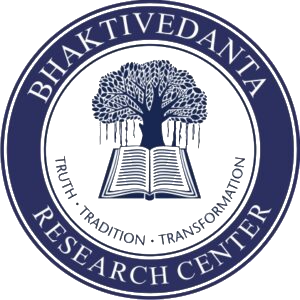History of Bhaktivedanta Research Center

Dr. Ferdinando Sardella

Dennis Harrison
It was September 2009 when Ferdinando Sardella, a then PhD student at the University of Gothenburg, Sweden, researching in Bengal, acquired a treasure trove – the personal library of Shri Sundarananda Vidyavinode, Secretary and Editor of well-known philosopher Shri Bhaktisiddhanta Sarasvati Thakura (1874-1937). The library was donated by the family of Shri Sundarananda Vidyavinode to HH Bodhayan Swami at the Gopinath Gaudiya Math in Mayapur who then gave it to Ferdinando Sardella. The rare and rich collection of the library included 3,000 books, journals and documents in Bengali, English and Sanskrit on the history, philosophy, wisdom, arts, literature and religion of Bengal (and today’s Bangladesh) from the 1850s to the 1940s. This historical treasure led to the foundation of the Bhaktivedanta Research Center in December 2009.
The research center’s founders and co-directors Dennis Harrison and Prof. Sardella started digitization of the very rare books in the first place to preserve them. After this, lamination of rare journals for preservation was done in cooperation with assistants from Kolkata’s Asiatic Society. Simultaneously, construction of a preserved library with study-places for visiting students along with a large room that would be suitable for conferences, lectures and meetings was constructed.
A professional librarian and various assistants were engaged since inception, including a digital photographer and a manuscript librarian in charge of the collection of old manuscripts from Bengal, Odisha, Bihar and Uttar Pradesh. So far, more than 1,000 manuscripts have been found, digitized and preserved at Bhaktivedanta Research Center.
In order to increase the collection of sections like philosophy, culture and society, another 14,000 books and 3,000 academic journals from the period since early 19th century till date have been added and catalogued over the past decade. The collection today includes a large number of texts on the culture and tradition Bengal and India. This is centrally located at Kolkata.
In 2016, the Bhaktivedanta Research Centre organized a comprehensive online catalogue of the center’s library collection using the integrated library system “Koha” with 3,000 titles online (brcindia.com) which was expanded later to include the entire collection. Today, many national and international academic scholars have visited and received copies of important texts for their studies from our research center.
In 2017, the next phase of Bhaktivedanta Research Center began wherein we introduced research studies on colonial at Kolkata from the 19th century to the first half of the 20th century. These studies focus on diaries, biographies, documents, journals and other areas significant to the philosophy and history of colonial Bengal. Since January 2020 regular lectures are being held at our center given by professors from Bengal and around the world. In future, education for MA and PhD courses are also being planned, in affiliation with the Calcutta University, to turn Bhaktivedanta Research Center into a one-stop learning hub.
